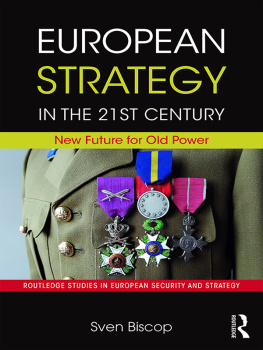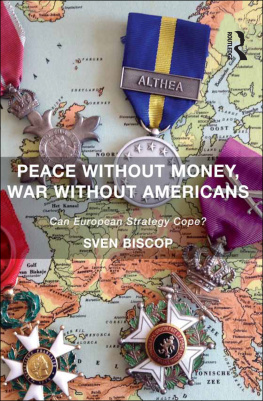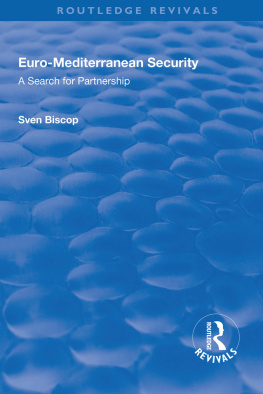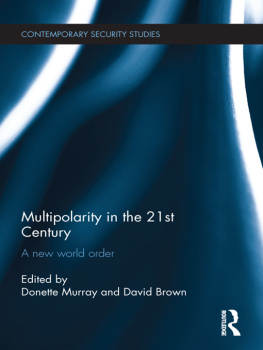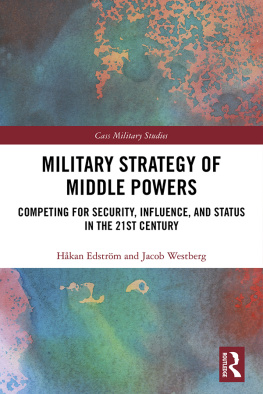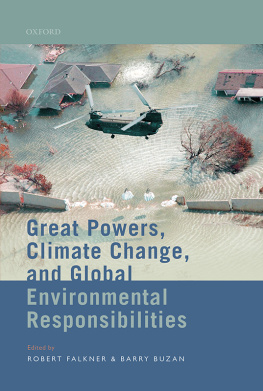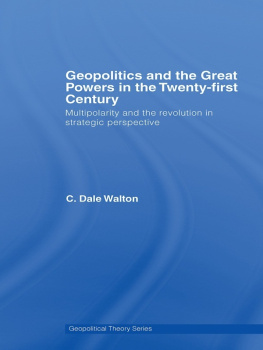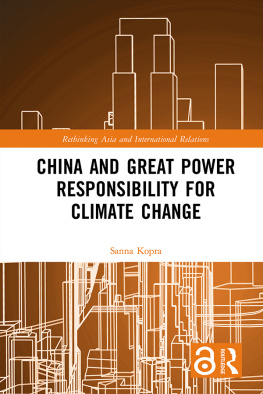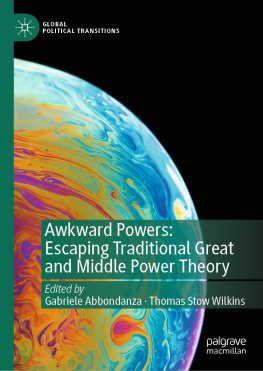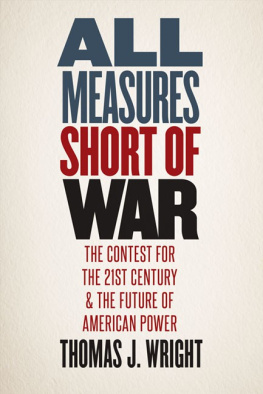European Strategy in the 21st Century
This book argues that Europe, through the European Union (EU), should act as a great power in the 21st century.
The course of world politics is determined by the interaction between great powers. Those powers are the US, the established power; Russia, the declining power; China, the rising power; and the EU, the power that doesnt know whether it wants to be a power. If the EU does not just want to undergo the policies of the other powers it will have to become one itself, but it should differ in its strategy. In this book, Sven Biscop seeks to demonstrate that the EU has the means to pursue a distinctive great power strategy, a middle way between dreamy idealism and unprincipled pragmatism, and can play a crucial stabilising role in this increasingly unstable world.
Written by a leading scholar, this book will be of much interest to students of European security, EU policy, strategic studies, and international relations.
Sven Biscop is a Professor at Ghent University, Belgium, and the Director of the Europe in the World Programme at the Egmont Royal Institute for International Relations in Brussels. He is a Senior Research Associate at the Peoples University of China in Beijing and an Honorary Fellow of the European Security and Defence College (ESDC).
Routledge Studies in European Security and Strategy
The aim of this series is to bring together the key experts on European security from the academic and policy worlds, and assess the state of play of the EU as an international security actor. The series explores the EU, and its member states, security policy and practices in a changing global and regional context. While the focus is on the politico-military dimension, security is put in the context of the holistic approach advocated by the EU.
Series editors:
Sven Biscop
Egmont Royal Institute for International Relations, Belgium
and
Richard Whitman
University of Kent, UK
European Union Military Operations
A Collective Action Perspective
Niklas I.M. Novky
The EU, Strategy and Security Policy
Regional and strategic challenges
Edited by Laura Chappell, Jocelyn Mawdsley and Petar Petrov
Europeanisation and the Transformation of EU Security Policy
Post-Cold War Developments in the Common Security and Defence Policy
Petros Violakis
EU-Japan Security Cooperation
Trends and Prospects
Edited by Emil Kirchner and Han Dorussen
European Strategy in the 21st Century
New Future for Old Power
Sven Biscop
For more information about this series, please visit: https://www.routledge.com/Routledge-Studies-in-European-Security-and-Strategy/book-series/SESS
First published 2019
by Routledge
2 Park Square, Milton Park, Abingdon, Oxon OX14 4RN
and by Routledge
52 Vanderbilt Avenue, New York, NY 10017
Routledge is an imprint of the Taylor & Francis Group, an informa business
2019 Sven Biscop
The right of Sven Biscop to be identified as author of this work has been asserted by him in accordance with sections 77 and 78 of the Copyright, Designs and Patents Act 1988.
All rights reserved. No part of this book may be reprinted or reproduced or utilised in any form or by any electronic, mechanical, or other means, now known or hereafter invented, including photocopying and recording, or in any information storage or retrieval system, without permission in writing from the publishers.
Trademark notice: Product or corporate names may be trademarks or registered trademarks, and are used only for identification and explanation without intent to infringe.
British Library Cataloguing-in-Publication Data
A catalogue record for this book is available from the British Library
Library of Congress Cataloging-in-Publication Data
Names: Biscop, Sven, author.
Title: European strategy in the 21st century : new future for old power / Sven Biscop.
Description: Abingdon, Oxon ; New York, NY : Routledge, 2019. | Series: Routledge studies in European security and strategy | Includes bibliographical references and index.
Identifiers: LCCN 2018036535 (print) | LCCN 2018047895 (ebook) | ISBN 9780429764004 (Web PDF) | ISBN 9780429763991 (ePub) | ISBN 9780429763984 ( Mobi) | ISBN 9781138384712 (hardback) | ISBN 9781138384729 (pbk.) | ISBN 9780429427442 (e-book)
Subjects: LCSH: European Union countries--Politics and government--21st century. | European Union countries--Foreign relations--21st century. | Security, International--European Union countries.
Classification: LCC JN30 (ebook) | LCC JN30 .B58 2019 (print) | DDC 355/.03354--dc23LC record available at https://lccn.loc.gov/2018036535
ISBN: 978-1-138-38471-2 (hbk)
ISBN: 978-1-138-38472-9 (pbk)
ISBN: 978-0-429-42744-2 (ebk)
To my mentor and friend, Rik Coolsaet
If we as academics produce a text on a topic that cannot be understood by the politician, diplomat or official who actually works on the issue, its probably not a good text. Life is short, and those who will not take the trouble to write clearly cannot properly expect to be read (Trevor-Roper, 2014, p. 139). This is what at the start of every academic year I tell the students who are considering writing their masters thesis under my supervision. I say that because it is my firm conviction that political science cannot be lart pour lart: art for arts sake. I too long for an era when social science was not yet hampered by impenetrable theories and methods or obscure postmodernist critique but instead sought to unveil the patterns of history and contemporary events in ways that would provide usable insights for policy (Green, 2017, p. 170). For me, the point of political science is indeed to say something useful for the people that are engaged in politics: politicians, officials, and citizens. I hope that this is what I have managed with this book.
It is an enormous pleasure and a great honour to be able to dedicate this book to my mentor and friend, Rik Coolsaet. It is Rik, now emeritus professor at Ghent University, who taught me how a researcher can usefully contribute to the political debate. It is Rik, who at Ghent University in 2002 sat on the jury for the defence of my PhD, who subsequently hired me at the EgmontRoyal Institute for International Relations in Brussels, the think tank associated with the Belgian Ministry of Foreign Affairs. In January 2009 I succeeded him there as director of the Europe in the World programme. In October 2016, also in succession of Rik, I became a part-time professor at Ghent University. Trying to do only half of what he did for the university and for the public debate is already a major challenge. Having Rik for a mentor is worth a lot. Having him for a friend is priceless. Thank you, Rik.
Rik has directly contributed to this book as well. Many of my ideas have matured by discussing them, notably with Rik, and with three other close friends: Brigadier-General (Ret.) Jo Coelmont, a senior associate fellow at Egmont (who read the first draft of the original Dutch-language version of this book), Prof. Dr. Alexander Mattelaer, director of the Europe programme at Egmont and professor at the Vrije Universiteit Brussel (VUB), and Prof. Dr. Luis Simn, director of the Brussels office of the Spanish Egmont, Real Instituto Elcano, and also a professor at the VUB. With them I can have conversations that I can have with nobody else. We work together so closely, effectively thinking together, that I dare no longer say which idea originated with whom. In any case, never trust a professor who claims to have thought it all up by himself. I also want to thank all other academic colleagues, in Belgium and abroad, therefore, as well as all Belgian, European, and other diplomats, officials, and military officers who were willing to share their insights with me. More often than not over a good glass or a good meal as Talleyrand said, Les bons diners font des bons dpches (de Waresquiel, 2006).

